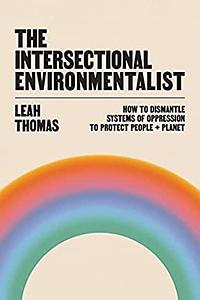Take a photo of a barcode or cover
551 reviews for:
The Intersectional Environmentalist: How to Dismantle Systems of Oppression to Protect People + Planet
Leah Thomas
551 reviews for:
The Intersectional Environmentalist: How to Dismantle Systems of Oppression to Protect People + Planet
Leah Thomas
informative
reflective
medium-paced
Most of the book was more U.S.-centric than I anticipated. Really liked the way they did the audiobook production for quotes, and the reflection/discussion questions at the end of each section. It was a good overview I think, I have noted from the book a few areas where I want to do some research and learn more.
challenging
hopeful
informative
inspiring
reflective
informative
inspiring
medium-paced
informative
fast-paced
3.5-ish.
I can see this being a solid foundation for people new to environmental justice, but if you’ve entered into the space before the first 80% especially will probably have a lot of stuff you already know. The last chapter had a more case-study style approach and tackled things like lithium mining, wind energy, and the consequences green energy in the way it’s currently being done has on marginalized communities, which worked better for me and gave me the most of what I wanted.
I did read it via audio from Libby and didn’t have access to the toolkit that people say comes with the book, so I can’t speak to the toolkit and if it was helpful.
I can see this being a solid foundation for people new to environmental justice, but if you’ve entered into the space before the first 80% especially will probably have a lot of stuff you already know. The last chapter had a more case-study style approach and tackled things like lithium mining, wind energy, and the consequences green energy in the way it’s currently being done has on marginalized communities, which worked better for me and gave me the most of what I wanted.
I did read it via audio from Libby and didn’t have access to the toolkit that people say comes with the book, so I can’t speak to the toolkit and if it was helpful.
Great introduction to "Intersectional Environmentalism," which Thomas defines as "an inclusive approach to environmentalism that advocates for the protection of both people and the planet," and how it can and should play a role in advocating for environmental and social justice.
As a straight, white, cis-gendered male, I have a lot of work to do to understand the privilege that I hold and how I can use this privilege to help make the world a better place for all.
While this is a book I intend to read again, my current takeaways are:
-People of color have long been at the fore of community advocacy
-The environmental movement used tactics pioneered by those advocating for civil and social justice
-Members of historically underrepresented groups (racial minorities, women, LGBTQ) long had to worry about advocating for equal rights as a member of this group; environmental issues & advocacy were secondary
-Multiple forms of discrimination overlap in the experiences of these marginalized groups
-You can't make decisions about the environment without impacting people, and these decisions often impact people in unequal ways. Therefore, when dealing with environmental issues, you must account for how they impact people and ensure that the positives (like access green spaces) and negatives (such as exposure to poor air quality) are not disproportionately borne by one group.
There's clearly work to do, but this book is a fantastic catalyst for thinking about how to change both the system and one's mindset. Highly recommend.
As a straight, white, cis-gendered male, I have a lot of work to do to understand the privilege that I hold and how I can use this privilege to help make the world a better place for all.
While this is a book I intend to read again, my current takeaways are:
-People of color have long been at the fore of community advocacy
-The environmental movement used tactics pioneered by those advocating for civil and social justice
-Members of historically underrepresented groups (racial minorities, women, LGBTQ) long had to worry about advocating for equal rights as a member of this group; environmental issues & advocacy were secondary
-Multiple forms of discrimination overlap in the experiences of these marginalized groups
-You can't make decisions about the environment without impacting people, and these decisions often impact people in unequal ways. Therefore, when dealing with environmental issues, you must account for how they impact people and ensure that the positives (like access green spaces) and negatives (such as exposure to poor air quality) are not disproportionately borne by one group.
There's clearly work to do, but this book is a fantastic catalyst for thinking about how to change both the system and one's mindset. Highly recommend.
challenging
hopeful
informative
inspiring
reflective
fast-paced
It was a short book and very readable. Every topic was max 6 pages and there were historical snippets and one question interviews mixed in to make it easy to read a small section at a time
informative
reflective
medium-paced
This was a solid primer on environmental racism. It is very surface level and each issue has a wide range of complexities that are not within the scope of this book. I do agree with other reviews saying that an essay style could have helped. I think a book like this can be read by anyone with any background on these issues and for that it is successful.
informative
inspiring
reflective
fast-paced
medium-paced





